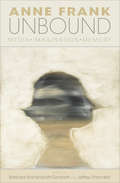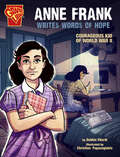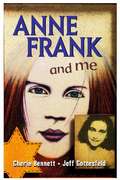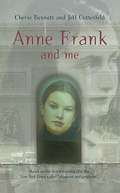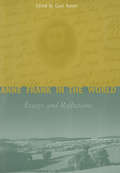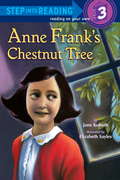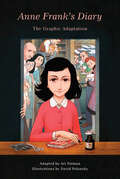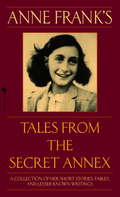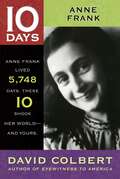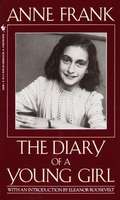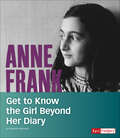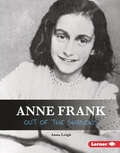- Table View
- List View
Anne Frank Unbound: Media, Imagination, Memory (The Modern Jewish Experience)
by Barbara Kirshenblatt-Gimblett and Jeffrey Shandler&“A brilliantly conceived and long overdue opening up [or deconstruction] of the Anne Frank story.&” —James Clifford, Professor Emeritus, History of Consciousness Department, University of California As millions of people around the world who have read her diary attest, Anne Frank, the most familiar victim of the Holocaust, has a remarkable place in contemporary memory. Anne Frank Unbound looks beyond this young girl&’s words at the numerous ways people have engaged her life and writing. Apart from officially sanctioned works and organizations, there exists a prodigious amount of cultural production, which encompasses literature, art, music, film, television, blogs, pedagogy, scholarship, religious ritual, and comedy. Created by both artists and amateurs, these responses to Anne Frank range from veneration to irreverence. Although at times they challenge conventional perceptions of her significance, these works testify to the power of Anne Frank, the writer, and Anne Frank, the cultural phenomenon, as people worldwide forge their own connections with the diary and its author. &“This collection of brilliant essays offers fascinating and unexpected insights into the significance of Anne Frank&’s iconic Holocaust-era diary from many disciplinary perspectives in the arts and humanities.&” —Jan T. Gross, the Norman B. Tomlinson Professor of War and Society, Princeton University &“This volume is a major contribution to scholarship regarding Anne Frank's diary and its cultural influence . . . Highly recommended.&” —Choice &“Engrossing . . . The overall aim is to provide a greater understanding of the general and particular engagement with Anne Frank as a person, a symbol, an icon, an inspiration, and perhaps most polarizing, as one victim, not the victim of the Nazi holocaust.&” —Broadside
Anne Frank Writes Words of Hope: Courageous Kid Of World War Ii (Courageous Kids Ser.)
by Debbie VilardiIn 1933, Adolf Hitler and the Nazi Party rose to power in Germany. The Nazis terribly persecuted Jews and other groups of people. They murdered millions of Jews across Europe during World War II. A pre-teen girl named Anne Frank and her family managed to hide from the Nazis for two years. During this time, Anne wrote about her experiences almost every day in her diary. Discover the courage of Anne and her family during one of the most horrific times in history.
Anne Frank and Me
by Cherie Bennett Jeff GottesfeldKnocked unconscious after explosions ring out during a field trip to an Anne Frank exhibit, boy-crazy Nicole Burns wakes to find herself living a parallel life as a Jew in 1942 Paris. This Nicole is dating the boy of her present-day dreams, but living under the Nazis gradually becomes a nightmare. Her family survives the Nazi occupation with the help of friends, but when her father is exposed as a resistant, their fate takes a dire turn. The shifts in Nicole's lives--from a carefree, sophisticated Parisian girl to a wretch riding in a cattle car with Anne Frank; from a modern girl focused only on the drama of her high school life to a thoughtful observer of the potential of everyday injustices--will engage teens and change their views of history found in books and the history we're making today.
Anne Frank and Me
by Cherie BennettThe successful play is now a gripping novel. Knocked unconscious after explosions ring out during a field trip to an Anne Frank exhibit, boy-crazy Nicole Burns wakes to find herself living a parallel life as a Jew in 1942 Paris. This Nicole is dating the boy of her present-day dreams, but living under the Nazis gradually becomes a nightmare. Her family survives the Nazi occupation with the help of friends, but when her father is exposed as a resistant, their fate takes a dire turn. The shifts in Nicole's lives--from a carefree, sophisticated Parisian girl to a wretch riding in a cattle car with Anne Frank; from a modern girl focused only on the drama of her high school life to a thoughtful observer of the potential of everyday injustices--will engage teens and change their views of history found in books and the history we're making today. Called "eloquent and poignant" by the New York Times and performed to wide acclaim across the country, the play has touched thousands. As a novel, it is sure to grow in popularity.
Anne Frank and Me
by Cherie Bennett Jeff GottesfeldIn one moment Nicole Burns's life changes forever. The sound of gunfire at an Anne Frank exhibit, the panic, the crowd, and Nicole is no longer Nicole. Whiplashed through time and space, she wakes to find herself a privileged Jewish girl living in Nazi-occupied Paris during World War II. No more Internet diaries and boy troubles for Nicole-now she's a carefree Jewish girl, with wonderful friends and a charming boyfriend. But when the Nazi death grip tightens over France, Nicole is forced into hiding, and begins a struggle for survival that brings her face to face with Anne Frank. "This is a powerful and affecting story." (KLIATT)
Anne Frank and the Children of the Holocaust
by Carol Anne LeeAnne Frank's diary changed how the world saw the Holocaust? this book will change how you see Anne Frank. Beginning with Otto Frank's idyllic childhood, follow the family's journey from its proud German roots through life under Nazi occupation to their horrifying concentration camp experiences. Interspersed with their story are personal accounts of survivors, excerpts from the other victims? journals, and black-and-white photos. A perfect blend of historical information and emotional narratives, this book makes an excellent companion to the diary, offering an in-depth look at the life of Anne Frank, and an intimate history of the young people who experienced the Holocaust. .
Anne Frank in Her Own Words
by Caroline KennonAnne Frank's youthful optimism was a stark contrast to the terrible monstrosities of World War II. While Anne and her family hid from the world in a secret annex, she confided in her diary, nicknamed Kitty, providing the world with an inside view of what it was like to grow up fearing the wrath of Nazi Germany. This biography uses Anne's moving writings to highlight the events of her short life. Her diary is a powerful tool and reminder of the unjust hate that caused the Holocaust. Sidebars and fact boxes offer more information about this time period.
Anne Frank in the Secret Annex: Who Was Who?
by The Anne Frank HouseAn extraordinary story of Anne Frank and the Secret Annex For two years during the Second World War, young, Jewish Anne Frank lived in hiding from the Nazis. Everything she experienced, thought, and felt, she confided in her diary. She was just as frank in her descriptions of the seven other people in the Annex and of the five helpers who endangered their own lives to look after them. Years later, Anne Frank's diary became world famous. The Secret Annex was so well set up that the hiders survived there for over two years. Who were these people, how did they meet, and what happened to them? This book shows the background and organization of the Annex and the personal stories of all involved, as well as their relationships and their fates. It also offers many never-before-published photographs. The result is an extraordinary group portrait that stays with the reader long after the last page is turned.
Anne Frank in the World: Essays and Reflections
by Carol Ann RittnerScholars, clergy, teachers and writers present stimulating essays on the theme that Anne Frank's Diary movingly symbolizes the triumph of childhood innocence over totalitarian brutality. This may be of value for classes and study groups with interests in religion and religious ethics, the Holocaust, ethnic cleansing, discrimination, the role of the individual in society, and the daunting moral dilemmas posed by emerging nationalisms all over the world.
Anne Frank on the Postwar Dutch Stage: Performance, Memory, Affect (Routledge Advances in Theatre & Performance Studies)
by Remco EnselThis book is a case study into the affective history of Holocaust drama offering a new perspective on the impact of The Diary of Anne Frank, the pivotal 1950s play that was a turning point in Holocaust consciousness. Despite its overwhelming success, criticism of the Broadway makeover has been harsh, suggesting that the alleged Americanization would not do justice to the violence of the Holocaust or Anne Frank’s budding Jewishness. This study revisits these issues by focusing on the play’s European appropriation delving into the emotional intensity with which the play was produced and received. The core of the exploration is a history of the Dutch staging in ethnographic detail, based on unique archival material such as correspondence with Otto Frank, prompt books, original tapes, blueprints of the set and oral history. The microhistory of the first Dutch performance of the stage adaptation of Anne Frank’s diary examines the staging in the context of the postwar hesitant development of publicly voiced Holocaust consciousness. Influenced by memory studies and affect theory, the emphasis is on the emotional impact of the drama on both the members of the cast and the audience and will be of great interest to students and scholars in theater and performance studies, memory studies, cultural history, Jewish studies, Holocaust studies and contemporary European history.
Anne Frank's Chestnut Tree (Step into Reading)
by Jane Kohuth Elizabeth SaylesHidden away in their Secret Annex in Amsterdam during World War II, Anne Frank and her family could not breathe fresh air or see the blue sky for years. But through an attic window Anne could see the branches of a tall chestnut tree. This small glimpse of nature gave Anne hope and courage. It inspired her writing, which, in turn, inspired the whole world. Jane Kohuth explores Anne Frank's strong belief in the healing power of nature in this Step 3 leveled reader biography for newly independent readers ages 5-8.
Anne Frank's Diary: The Graphic Adaptation (Pantheon Graphic Library)
by Anne Frank David PolonskyA timeless story rediscovered by each new generation, The Diary of a Young Girl stands without peer. This graphic edition remains faithful to the original, while the stunning illustrations interpret and add layers of visual meaning and immediacy to this classic work of Holocaust literature.For both young readers and adults The Diary continues to capture the remarkable spirit of Anne Frank, who for a time survived the worst horror the modern world has seen—and who remained triumphantly and heartbreakingly human throughout her ordeal. Includes extensive quotations directly from the definitive edition; adapted by Ari Folman, illustrated by David Polonsky, and authorized by the Anne Frank Foundation in Basel.
Anne Frank's Story: Her Life Retold for Children
by Carol Ann LeeExpands on the story of Anne Frank revealed in her diary by providing details about the family and friends who shaped her life and gave her the strength to endure two years of hiding in an attic in Nazi-occupied Holland.
Anne Frank's Tales from the Secret Annex
by Anne Frank Ralph Manheim Michel MokFables, tales, reminiscences, and essays by young Anne Frank while she was hidden during World War II
Anne Frank's Tales from the Secret Annex
by Anne FrankHiding from the Nazis in the "Secret Annexe" of an old office building in Amsterdam, a thirteen-year-old girl named Anne Frank became a writer. The now famous diary of her private life and thoughts reveals only part of Anne's story, however. This book completes the portrait of this remarkable and talented young author.Tales from the Secret Annex is a complete collection of Anne Frank's lesser-known writings: short stories, fables, personal reminiscences, and an unfinished novel. Here, too, are portions of the diary originally withheld from publication by her father. By turns fantastical, rebellious, touching, funny, and heartbreaking, these writings reveal the astonishing range of Anne Frank's wisdom and imagination--as well as her indomitable love of life. Anne Frank's Tales from the Secret Annex is a testaments to this determined young woman's extraordinary genius and to the persistent strength of the creative spirit.From the Paperback edition.
Anne Frank, Beyond The Diary: A Photographic Remembrance
by Anna Quindlen Tony Langham Ruud Van der Rol Rian Verhoeven Plym PetersAnne Frank lived a life filled with the enthusiasms and hopes shared by many young women coming into adulthood. But the times Anne lived in and wrote of in her diary made her simple life extraordinary. <P><P> In over one hundred photographs, many which have never been published, this poignant memoir brings to life the harrowing story of one young Jewish woman's struggle to survive during a period of history which must never be forgotten. <P><P> "All libraries will want this: for classroom units studying the Holocaust, for kids reading the diary, for everyone who remembers it." - Booklist
Anne Frank: Anne Frank (10 Days)
by David ColbertBestselling author David Colbert creates a new form of biography as he examines the life of Anne Frank by looking at the ten most important days of her life.You're about to be an eyewitness to ten crucial days in Anne Frank's life, including: A wrenching decision to flee Germany A chilling letter that sent her family into hiding The gift of her one true confidante - her diary A sickening betrayal to the Nazis And a tragedy in the concentration camps just before liberation. These days and five others shook Anne's world - and yours.
Anne Frank: Diary of a Young Girl
by Anne FrankA teenage Jewish girl's recorded thoughts and impressions while she and her family were being hidden in a safe house during the Nazi occupation of Holland.
Anne Frank: Famous People, Famous Lives
by Harriet CastorWhen Anne Frank is given a diary, she starts to write to her made-up friend, Kitty. But during World War II Anne and her family are forced to hide from the Nazi Germans. Find out all about the diary of Anne Frank with this story that is packed with all the facts and colourful pictures. This book is part of a series of books, Famous People, Famous Lives, which are suitable for ages 6-12. They tell the stories of famous men and women and great events in history. Written by successful authors, they are enjoyable reads which are packed with facts and illustrations.
Anne Frank: Famous People, Great Events
by Harriet CastorWhen Anne Frank is given a diary, she starts to write to her made-up friend, Kitty. But during World War II Anne and her family are forced to hide from the Nazi Germans. Find out all about the diary of Anne Frank with this story that is packed with all the facts and colourful pictures. This book is part of a series of picture books, Famous People, Great Events, which are suitable for ages 6-12. They tell the stories of famous men and women and great events in history. Written by successful authors, they are enjoyable reads which are packed with facts and colourful illustrations.Each book includes a timeline of key dates, a quiz and index.
Anne Frank: Get To Know The Girl Beyond Her Diary (People You Should Know Ser.)
by Kassandra RadomskiShortly after her 13th birthday, Anne Frank and her family were forced into hiding. It was World War II and the German Nazis were rounding up Jewish people and killing them or sending them to work in horrible camps. During her time in hiding, Anne wrote about the experience in her diary. What was the fate of Anne and her family? What became of her diary? Find the answers to these questions and more in Anne Frank: Get to Know the Girl Beyond Her Diary.
Anne Frank: Get to Know the Girl Beyond Her Diary (People You Should Know)
by Kassandra RadomskiShortly after her 13th birthday, Anne Frank and her family were forced into hiding. It was World War II and the German Nazis were rounding up Jewish people and killing them or sending them to work in horrible camps. During her time in hiding, Anne wrote about the experience in her diary. What was the fate of Anne and her family? What became of her diary? Find the answers to these questions and more in Anne Frank: Get to Know the Girl Beyond Her Diary.
Anne Frank: Her Life in Words and Pictures from the Archives of the Anne Frank House
by Menno Metselaar Ruud van der Rol Arnold J. PomeransOn a summer day in 1942, Anne Frank and her family went into hiding from the Nazis. Until the day they arrested her, more than two years later, she kept a diary. ANNE FRANK is the indispensable visual guide to her tragic, but inspiring story. Produced in association with The Anne Frank House and filled with never-before-published snapshots, school pictures, and photos of the diary and the Secret Annex, this elegantly designed album is both a stand-alone introduction to Anne's life and a photographic companion to a classic of Holocaust literature.
Anne Frank: Life in Hiding
by Johanna HurwitzIn this sensitive introduction to the Holocaust and to the life of the little girl who hid out and kept a diary during World War II, this acclaimed author deftly evokes the background of the war while capturing the girl's unforgettable spirit.
Anne Frank: Out of the Shadows
by Anna LeighWhile her family hid during the Holocaust, Anne Frank recorded her personal reflections as well as the harrowing circumstances she faced in her diary. Read about her life before and after the start of World War II.
